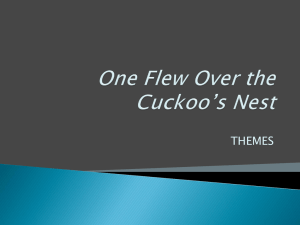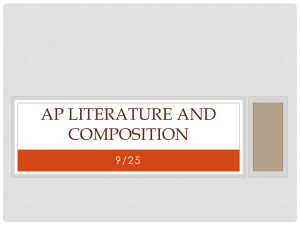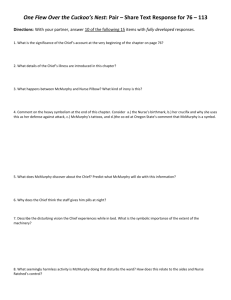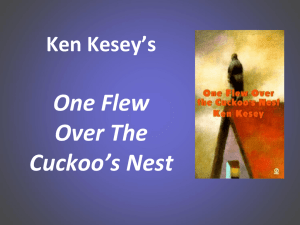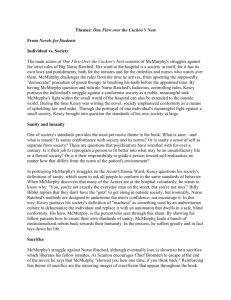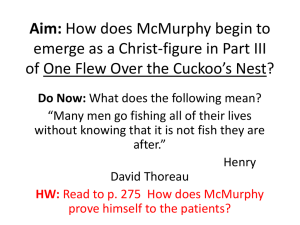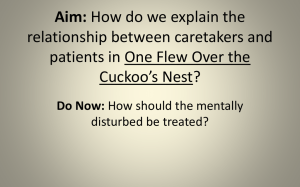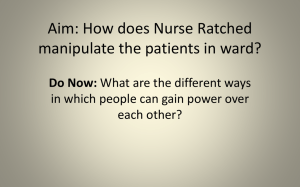one flew over the cuckoo`s nest: notes from the novel
advertisement
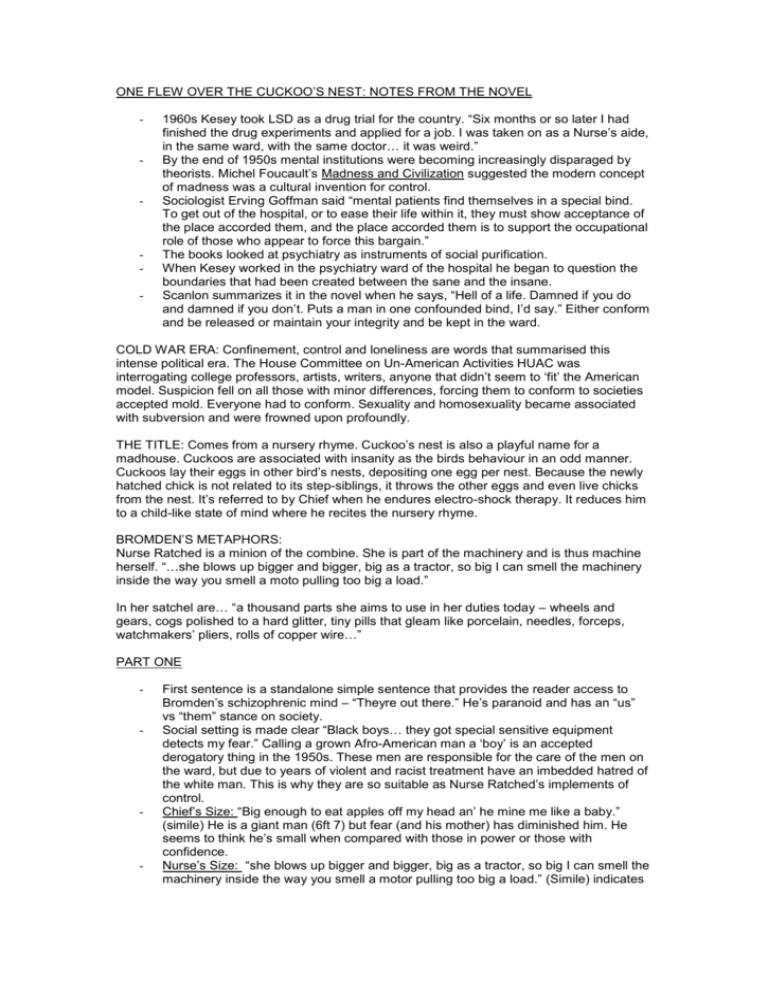
ONE FLEW OVER THE CUCKOO’S NEST: NOTES FROM THE NOVEL
-
-
-
-
1960s Kesey took LSD as a drug trial for the country. “Six months or so later I had
finished the drug experiments and applied for a job. I was taken on as a Nurse’s aide,
in the same ward, with the same doctor… it was weird.”
By the end of 1950s mental institutions were becoming increasingly disparaged by
theorists. Michel Foucault’s Madness and Civilization suggested the modern concept
of madness was a cultural invention for control.
Sociologist Erving Goffman said “mental patients find themselves in a special bind.
To get out of the hospital, or to ease their life within it, they must show acceptance of
the place accorded them, and the place accorded them is to support the occupational
role of those who appear to force this bargain.”
The books looked at psychiatry as instruments of social purification.
When Kesey worked in the psychiatry ward of the hospital he began to question the
boundaries that had been created between the sane and the insane.
Scanlon summarizes it in the novel when he says, “Hell of a life. Damned if you do
and damned if you don’t. Puts a man in one confounded bind, I’d say.” Either conform
and be released or maintain your integrity and be kept in the ward.
COLD WAR ERA: Confinement, control and loneliness are words that summarised this
intense political era. The House Committee on Un-American Activities HUAC was
interrogating college professors, artists, writers, anyone that didn’t seem to ‘fit’ the American
model. Suspicion fell on all those with minor differences, forcing them to conform to societies
accepted mold. Everyone had to conform. Sexuality and homosexuality became associated
with subversion and were frowned upon profoundly.
THE TITLE: Comes from a nursery rhyme. Cuckoo’s nest is also a playful name for a
madhouse. Cuckoos are associated with insanity as the birds behaviour in an odd manner.
Cuckoos lay their eggs in other bird’s nests, depositing one egg per nest. Because the newly
hatched chick is not related to its step-siblings, it throws the other eggs and even live chicks
from the nest. It’s referred to by Chief when he endures electro-shock therapy. It reduces him
to a child-like state of mind where he recites the nursery rhyme.
BROMDEN’S METAPHORS:
Nurse Ratched is a minion of the combine. She is part of the machinery and is thus machine
herself. “…she blows up bigger and bigger, big as a tractor, so big I can smell the machinery
inside the way you smell a moto pulling too big a load.”
In her satchel are… “a thousand parts she aims to use in her duties today – wheels and
gears, cogs polished to a hard glitter, tiny pills that gleam like porcelain, needles, forceps,
watchmakers’ pliers, rolls of copper wire…”
PART ONE
-
-
-
-
First sentence is a standalone simple sentence that provides the reader access to
Bromden’s schizophrenic mind – “Theyre out there.” He’s paranoid and has an “us”
vs “them” stance on society.
Social setting is made clear “Black boys… they got special sensitive equipment
detects my fear.” Calling a grown Afro-American man a ‘boy’ is an accepted
derogatory thing in the 1950s. These men are responsible for the care of the men on
the ward, but due to years of violent and racist treatment have an imbedded hatred of
the white man. This is why they are so suitable as Nurse Ratched’s implements of
control.
Chief’s Size: “Big enough to eat apples off my head an’ he mine me like a baby.”
(simile) He is a giant man (6ft 7) but fear (and his mother) has diminished him. He
seems to think he’s small when compared with those in power or those with
confidence.
Nurse’s Size: “she blows up bigger and bigger, big as a tractor, so big I can smell the
machinery inside the way you smell a motor pulling too big a load.” (Simile) indicates
-
-
-
-
-
-
-
-
-
-
-
-
again how Nurse is a machine. Hyperbolic statement also illustrates the way
Bromden sees power as size. He has no power, therefore he is small.
Comments on her bust: “and the size of her bosom. A mistake was made somehow in
manufacturing, putting those big, womanly breasts on what would of otherwise been
a perfect work, and you can see how bitter she is about it.” He presumes that the
Nurse does not wish to be seen as a woman – as woman can be faulty. She’d rather
be seen as a perfect state apparatus for administering control. Also a part of the
extended machine metaphor.
Chief’s previous life: “one time Papa and me were hunting birds in a stand of cedar
treest…” “… remember things about the village and the big Columbia River…” The
memories of his former life contrast effectively with his new life. We learn that the
Chief was a skilled hunter and Indian. His father was a chief and a great man who
was reduced to alcoholism.
Chief’s Paranoia: “They start the fog machine again…” The Chief has schizophrenic
delusions about fog that comes and obscures reality. He allows himself to get lost in it
as it’s the easiest thing to do. The fog often begins when he has taken his medication,
or when he starts to fear things. It’s an escape from reality. Because of the fog his
version of McMurphy’s story is his own and he declares “it’s the truth even if it didn’t
happen.” (oxymoron)
Public Relations Man: “always clapping his wet hands together and saying how
overjoyed he is that mental hospitals have eliminated all the old-fashioned cruelty.”
Irony is used to show how the combine operates. The PR man presents to society a
positive outward appearance of mental asylums when this is not the case at all.
How McMurphy’s Admission Differs: “Most days I’m the first one to see the
Admission, watch him creep in the door and slide along the wall and stand scared…”
– “…even though I can’t see him, I know he’s no ordinary Admission… he tells them
in a loud brassy voice that he’s already plenty damn clean thank you.” From the very
beginning we can expect something different about McMurphy.
McMurphy’s Dialect/Dialogue: says “vacilities” instead of facilities. Calls the black
boys, “Sam” for Sambo (exceedingly derogatory). Inaccurate grammar usage
indicates a lack of formal education: “I never been in a Institute of Psychology
before.”
Initial Description: Chief shows admiration and awe for the new Admission. Straight
away he compares him to his own father: “He talks a little the way Papa used to,
voice loud and full of hell, but he doesn’t look like Papa. Papa was a full-blood
Columbia Indian… he’s broad as Papa was tall, broad across the jaw and shoulders
and chest…”
First thing McMurphy says and does: “Good morning,’ buddies.” “…when nobody
makes a move to say anything… he commences to laugh. Nobody can tell exactly
why he laughs… it’s free and loud and it comes out of his wide grinning mouth and
spreads in rings bigger and bigger till it’s lapping against the walls all over the ward.
…This sounds real. I realise … it’s the first laugh I’ve heard in years.” Laughter
represents freedom and individuality. The patients fear being different and laughing
aloud will draw attention to their differences, so instead the laugh quietly behind
hands.
Self Declared Gambling Fool: “My name is McMurphy, buddies, R.P.McMurphy, and
I’m a gambling fool.” (RPM – rates per minute) Ultimately it’s his penchant for
gambling that leads to his ultimate downfall. His bid to get the better of Nurse fails
and he is instead destroyed by the “combine’
Sexual Dominance: His playing cards have couples copulating on the backs: “Every
one different. Fifty-two positions.” An open enjoyment of sex and sexuality during this
time was viewed as anti-social. The men are unaccustomed to open sexual
discourse.
How society sees him as insane: “I got in a couple of hassles at the work farm… and
the court ruled that I’m a psychopath… Now they tell me a psychopath’s a guy fights
too much and fucks too much.” Society imposes a series of expectations on
individuals. If they fail to comply then they are ostracised – just as McMurphy and the
other patients were.
The Acutes: “…known as Acutes because the doctors figure them still sick enough to
be fixed…” – “They tell jokes to each other and snicker in their fists…” He comments
-
-
-
-
-
-
-
-
-
-
that “they spy on each other” and when one person lets slip something odd they go to
the Nurse’s station to “write down the piece of information.” By doing so they get a
star by their name and a sleep in the next day.” This shows how the Nurse controls
by simple tactics that ensure her ultimate dominance on the ward.
The Chronics: “the culls of the Combine…” he says they (incl himself) “are machines
with flaws inside that can’t be repaired. Ruckly is a fearful example of what the
Combine can do to you. He arrived and “was… a holy nuisance… kicking the black
boys and biting the student nurses…” He was lobotomised. Lobotomy is used as a
panacea (punishment) for aggressive behaviour.
How the Nurse uses Chronics as Control: “The Big Nurse recognizes this fear and
knows to how to put it to use: she’ll point out to an Acute, whenever he goes into a
sulk, that you boys be good boys and cooperate with the staff policy which is
engineered for your cure, or you’ll end up over on that side.” She recognises that
what has happened to those men who have endured EST or lobotomies is not a
pleasant thing and uses it to scare the Acutes into subservience.
McMurphy’s dialogue when compared to Billy Bibbit: “Who’s the bull goose loony
here?” vs. “he isn’t the buh-buh-buh-bull goose loony yet, though he’s next in luh-luhline…” McMurphy contrasts dramatically with the other patients. Despite a lack of
education, McM speaks the most sense and shows the greatest amount of insight
into society.
Harding’s Hands: “so long and white and dainty I think they carved each other out of
soap, and sometimes they get loose and glide around in front of him free as two white
birds until he notices them and traps them between his knees. It bothers him that he’s
got pretty hands.” (Bird metaphor) Harding’s hands are a primary embarrassment. He
is effeminate and highly educated and feels judged for this by society.
McMurphy’s thoughts on Society: “but you know how society presecutes a dedicated
man. Ever since I found my callin’ I done time in so many small-town jails..”
McMurphy shakes everyone’s hands in introducation: “shakes hands that he has to
pick up out of laps like picking up dead birds, mechanical birds, wonders of tiny bones
and wires that have run down and fallen.”
First understanding the Chief can hear and speak: All of a sudden I was scared he
was laughing because he knew the way I was sitting there with my knees pulled up
and my arms wrapped around them, staring straight ahead as though I couldn’t hear
a thing, was all an act.” We learn that the Chief was first ignored by white capitalists
who came to buy his village from his father. He spoke out against them and they
ignored him. Since then he became increasingly ignored and felt it was easiest to be
seen as deaf and mute.
The power of McMurphy – When shaking the Chief’s hand the Chief says, “my hand
commenced to feel peculiar and went to swelling up out there on my stick of an arm,
like he was transmitting his own blood into it. It rang with blood and power. It blowed
up near as big as his, I remember…” McMurphy has an odd power over the men, he
gave them strength and courage.
Nurse’s opinion of McMurphy: “the new patient is planning to take over. He is what
we call a ‘manipulator.’” The Nurse rose to battle at the very beginning.
Explanation of the Combine: “…{Nurse} working alongside others like her who I call
the “Combine”, which is a huge organization that aims to adjust the Outside as well
as she has the Inside (note proper nouns). “…The ward is a factory for the Combine.
It’s for fixing up mistakes made in the neighbourhoods and in the schools and in the
churches, the hospital is.”
Chief’s History: “I was an electrician’s assistant in training camp before the Army
shipped me to Germany…”
The Hate the Afro-American boys feel: “His mother was raped in Georgia while his
papa stood by tied to the hot iron stove…blood streaming into his shoes. The boy
watched from a closet, five years old…- She appraises them and their hate for a
month or so, then lets them go because they don’t hate enough.” “…They are in
contact on a high-voltage wavelength of hate, and the black boys are out there
performing her bidding before she even thinks it.”
Chief’s size: I was a whole lot bigger in those days.
Harding & Wife: “My dear sweet but illiterate wife thinks any word or gesture that
does not smack of brickyard brawn and brutality is a word or gesture of weak
-
-
-
-
-
-
-
-
-
-
-
dandyism.” Harding’s wife emasculates him by drawing attention to his feminine
attributes and worshipping those of standard masculinity. She is the reason for his
lack of esteem and his sense of inadequacy.
Nurse notes on McMurphy: McMurry. Randle Patrick. Committed by the state from
the Pendleton Farm for Correction. For diagnosis and possible treatment. Thirty-five
years old. Never married. Distinguished Service Cross in Korea, for leading an
escape from a Communist prison camp. A dishonourable discharge, afterward, for
insubordination. Followed by a history of street brawls and barroom fights and a
series of arrests for Drunkenness. Assaut and Batter. Disturbing the Peace, repeated
gambling, and one arrest – for Rape.” Aside from the rape, which we discover was
statutory, McMurphy doesn’t appear any other than a standard American man. He’s
far from insane.
Laughter: “There’s something strange about a place where the men won’t let
themselves loose and laugh.” McMurphy finds it disconcerting that no one laughs.
Laughter is the best medicine, it’s a panacea for all wounds, for all concerns and for
all occasions.
McMurphy’s Lessons: “That’s a good rule for a smart gambler: look the game over
awhile before you draw yourself a hand.” A poignant lesson that he didn’t quite learn
himself. (Prophetic? Foreshadowing?)
Doctor’s Theory Behind Group Therapy: “Our intention… is to make this as much like
your own democratic, free neighbourhoods as possible – a little world Inside that is a
made-to-scale prototype of the big world Outside that you will one day be taking your
place in again.” Society continues to control and restrict the men by forcing them to
live in similar conditions to outside. When someone does something odd, it’s up to the
rest of the men to act as society, point the finger and draw attention to it until they
remedy that behaviour.
McMurphy’s theory on Group Therapy: “Bunch of chickens at a peckin’ party” – “The
flock gets sight of a spot of blood on some chicken and they all go to peckin’ at it,
see, till they rip the chicken to shreds, blood and bones and feathers. But usually a
couple of the flock gets spotted in the fracas, then it’s their turn.” – “No, buddy, not
that. She ain’t peckin’ at your eyes. That’s not what she’s peckin’ at.” Following this
speech they cease informing on one another. This is another example of how
perceptive McMurphy is, despite his base analogy, it makes perfect sense. Again, the
birds are used as a metaphor for the men.
McMurphy on the Nurse’s intentions: “No, that nurse ain’t some kinda monster
chicken, buddy, what she is, is a ball-cutter… people who try to make you weak so
they can get you to toe the line, to follow their rules, to live like they want you to… to
do this… by getting’ you where it hurts the worst.” The Nurse, Chief’s mother, Billy’s
mother and Harding’s wife are all examples of ‘ball-cutters’ – woman that try to
emasculate men.
McMurphy to Harding on Harding’s sanity: “I can tell you’re not any crazier than the
average asshole on the street-“
McMurphy on laughing: “Man, when you lose your laugh you lose your footing. A man
go around lettin’ a woman whup him down till he can’t laugh any more, and he loses
one of the biggest edges he’s got on his side.”
Harding sets the challenge: “Do you think you could use it (McMurphy’s weapon is his
sexuality) against Miss Ratched, McMurphy? Ever?
McMurphy Responds: “… any of you sharpies here willing to take my five bucks that
says that I can get the best of that woman – before the week’s up – without her
getting the best of me? What we soon learn is that they all desperately want
McMurphy to break the Nurse, as they’re too scared to do it themselves.
Why McMurphy came to the institution: “Another thing: I’m in this place because
that’s the way I planned it, pure and simple, because it’s a better place than a work
farm.”
McMurphy’s Dialogue: “A bee in her butt, a burr in her bloomers. Get her goat. Bug
her till she comes apart.” Note the contrast of dialogue between McMurphy and
Harding. McMurphy uses colloquial, nature-sourced phrases which contrast to
Harding’s pscho-analysis, academic analogies.
How the Hospital can change a man: Chief recalls a time when Santa Claus arrived
at the hospital. He said that the black boys moved in, he was kept for six years before
-
-
-
-
-
-
-
-
-
they discharged him, clean-shaven and skinny as a pole. The place can even
transform Santa. This short and unusual train of thought illustrates how powerful the
Nurse is, and how unlikely it is that McMurphy will win the battle. If she can change
Santa, then she can certainly change him.
McMurphy’s presence is remedial for the Chief: “They haven’t really fogged the place
full force all day today, not since McMurphy came in.”
McMurphy’s Boxers: “The shorts under his work pants are coal black satin covered
with big white whales.” His boxers are a significant symbol of his strength, his virility,
and calls to memory ideas about Ahab in Moby Dick.
Chief slips up: “Why you sure did give a jump when I told you that coon was coming.”
The Chief is so empowered by and drawn to McMurphy that he begins to let his guard
down around him.
Priority of Aides is to see McMurphy’s downfall: Blastic dies in the night and the first
thing the aides tell the Nurse is that McMurphy fails to follow ward policy.
Chief’s Metaphor of Nurse as Machinery: “She rumbles past she’s already big as a
truck, trailing that wicker bag behind in her exhaust like a semi behind a Jimmy
Diesel. Her lips are parted, and her smile’s going out before her like a radiator grill. I
can smell the hot oil and magneto spark when she goes past, and ever step (that) hits
the floor she blow up a size bigger, blowing and puffing…
Chief’s Metaphor for Nurse’s anger: (About anger to an Aide) “…she might freeze him
and shatter him all to hell by just looking: all the hate and fury and frustration… he
can feel it blast against him like a blizzard wind, slowing him more than ever. He has
to lean into it, pulling his arms around him. Frost forms in his hair and eyebrows. He
leans farther forward, but his steps are getting slower; he’ll never make it.
Chief’s thoughts on Nurse and the bet: “She’s too big to be beaten… she has all the
power of the Combine behind her.” The Chief knows how futile McMurphy’s pursuits
are, just as the rest do, but they continue to encourage McM, propelling him forward
in a pointless exercise that will only lead to his demise.
McMurphy’s attempt to lift the Control Panel: It’s a control panel with handles and
cranks. “I don’t know what he’s driving at; broad and big as he is, it’d take three of
him to move that panel, and he knows it.” – “But I tried, though,” he says.
“Goddammit, I sure as hell did that much, now, didn’t I?” He says this after Harding
admits that he’s too scared to contradict what the Nurse says. He’s consciously trying
to teach them to take on battles even when they know they’re not going to win. It
makes the reader wonder whether he knew he’d lose the battle with Big Nurse.
More on Chief’s history: He was hurt seeing what happened to his father and the tribe
as they sold off their lifestyle at the Colombian River so the Govt. could make a
hydro-electric dam. His mother encouraged the decision and this drove his father to
drink. – When he opens the window in Part II he says “It’s fall coming, I thought, I can
smell that sour-molasses smell of silage.” He can detect the season from the smell of
the air. This illustrates how out of context he is in the ward.
Chief lifting his hand for the fishing trip: “McMurphy’s got hidden wires hooked to it,
lifting it slow just to get me out of the fog and into the open where I’m fair game. He’s
doing it, wires… No. That’s not the truth. I lifted it myself.” Illustrates how easy it is for
the men to blame McMurphy for their change in behaviour.
The men increasingly compromise the Nurse’s authority: McMurphy wants the men to
watch the baseball. They took a vote and majority agreed. The Nurse refuses to
switch the TV time with their cleaning time. So the men, for the full week, sit in front of
the Television when the baseball should be on.
PART II
- Staff meeting on McMurphy: One young resident suggests that “he is simply a shrewd
con man, and not mentally ill at all.” The doctor responds, “Don’t you recognise the
arch type of psychopath? I’ve never heard of a clearer case. This man is a Napoleon,
a Genghis Khan, Attila the Hun.” McMurphy is a political threat. The Nurse reveals
her game plan and says “we have weeks” to break him.
- Another side to McMurphy: “I’d see him do things that didn’t fit with his face or hands,
thigns like painting a picture at OT with real paints on a blank paper with no lines or
numbers anywhere on it to tell him where to paint, or like writing letters to somebody
-
-
-
-
-
-
-
-
in a beautiful flowing hand.” The patients tend to see McMurphy as their God and
forget that he is fallible, can be gentle and have private skills.
The Nurse Belittles the Men: “You men are in this hospital… because of your proven
inability to adjust to society.” They remain in hospital as she feeds their inadequacies,
making them fear a return to society.
McMurphy discovers how to get out of hospital: The lifeguard at the pool explains it to
him. “The next day he surprised everybody on the ward by getting up early and
polishing that latrine till it sparkled.” He stops speaking up against the Nurse and
when Cheswick demands they get their cigarettes back from Nurse McMurphy fails to
stand up and support him. This drives Cheswick to drown himself in frustration.
How the Nurse controls by innuendo and allusion: Sefelt has a fit and Fredrickson
argues against the Nurse about the drugs she had been administering that makes
Sefelt unwell. “I know, Bruce. Why do you get so upset? I’ve never understood what
went on between you and your friend that made you get so defensive!”
Harding’s Wife: “Dale when are you going to learn to laugh instead of making that
mousy little squeak?” She complains that his friends continue to come around and
she describes them as, “The hoity-toity boys with the nice long hair…and the limp
little wrists.” She denigrates her husband, feeds is paranoia’s and makes him feel
inadequate.
McMurphy’s Theory: “…nobody’s very big in the first place, and it looks to me like
everybody spends their whole life tearing everybody else down.” Again a poignant
and simple lesson that rings with truth.
McMurphy wonders why they rely on him so much: “…why you guys were coming to
me like I was some kind of savior.” He understands that they need him to do their
bidding, to give them courage and make them feel normal.
Harding: I’m voluntary. I’m not committed. …As a matter of fact there are only a few
men on the ward who are committed.” This statement shocks McMurphy as he has
the most to lose by
Breaking Glass: When the Nurse revokes use of the tub-room as punishment for the
Baseball watching McMurphy breaks her glass for the first time. Her actions are as
transparent as glass, and so he wants her to know he plans to shatter her.
PART III
- McMurphy’s influence spreads: When the window was fixed he broke it again.
Harding starts to flirt with the Nurses, and Billy Bibbit throws the basketball in the
glass when it is repaired for a second time.
- Nurses’s fear tactics: “the nurse started steadily bringing in clippings from the
newspapers that told about wrecked boats and sudden storms on the coast.” She
aims to deter the men from partaking in the fishing trip.
- Chief’s perception of size and his father: “You’re a lot bigger and tougher than I am…
I’m way too little. I used to be big, but not no more. You’re twice the size of me.”
(McM) “Hoo boy, you are crazy, aren’t you… you’re the biggest Indian I ever saw.” “My Papa was a full Chief and his name was Tee Ah Millatoona. That means ThePine-That-Stands-Tallest-on-the-Mountain… He was real big when I was a kid. My
mother got twice his size… she got bigger all the time.. bigger… the Combine’s big –
big. He fought it a long time till my mother made him too little to fight any more and he
gave up… he finally just drank… put the bottle to his mouth he don’t suck out of it, it
sucks out of him until he’s shrunk so wrinkled and yellow even the dogs don’t know
him…”
- Chief’s awe of McM: “I just want to touch him because he is who is.”
- McM convinces George to join them – foreshadowing of his defeat “Well, what the
devil. I gave up the idea of comin’ out ahead days ago.” He’s talking here about
making money off the trip, but also of coming out of the asylum. He’s already decided
to be the saviour for these men.
- Chief describes the day – uses a metaphor that reflects themselves ‘leaves were
hitting the fence, turning into birds and flying away.”
- Biblical allusion: As McMurphy led the twelve of us towards the ocean/ (12 disciples)
PART IV
- Chief and McM get EST: for protecting George in the shower against the black boys
the two get administered EST. Chief realises that McM is as exhausted as he is, but
continues to put on a confident and brave front. It’s the first time Chief gets EST and
doesn’t come to in the fog, instead he sees things clearly. McM refuses to apologise
or admit guilt for what he has done and so the EST continues as a severe
punishment. He is finally returned to the ward.
- Billy’s relationship with his mother: “Billy lay beside her and put his head in her lap
and let her tease at his ear with a dandelion fluff.” He wants to have a girlfriend and
go to college.
- McMurphy arranges a party: Candy and her friend Sandy one night and Candy and
Billy retire to have sex. They all get drunk, break into the medication room, race
around in wheelchairs. Harding is aware of McMurphy’s fate and encourages
McMurphy to escape. Turkle is supposed to wake up McM and Sandy to escape
before the Big Nurse’s shift begins, but he fails asleep and fails to do so. They are
found out in the morning by Nurse.
- Harding’s reason for self-admission: “I indulged in certain practises that our society
regards as shameful. And I got sick. It wasn’t the practises that our society regards as
shameful. And I got sick. It wasn’t the practises, I don’t think, it was the feeling that
the great, deadly, pointing forefinger of society was pointing at me – and the great
voice of millions chanting, ‘Shame. Shame. Shame.’ It’s society’s way of dealing with
someone different.”
- Billy Bibbit’s Suicide: Billy’s sexual encounter emancipates him from his awkward
sense of self and when caught the Chief says he “moved like fat cats full of warm
milk, lazy in the sun… He looked pleased with his success.” The Nurse knows how to
alter his mental state and “castrate” him again by questioning what his mother would
make if it… “She got the response she was after. Billy flinched and put his hand to his
cheek like he’d been burned with acid.” Billy slices his throat in the Doctor’s office
when left unsupervised. The Nurse blames McMurphy: “First Charles Cheswick and
now William Bibbit! I hope you’re finally satisfied.”
- McMurphy’s final Attack: “We couldn’t stop him because we were the ones making
him do it… It was us that had been making him go on for weeks, keeping him
standing long after his feet and legs had given out, weeks of making him wink and
grin and laugh and go on with his act long after his humour had been parched dry
between two electrodes… after he’d smashed through that glass door… he grabbed
for her and ripped her uniform all the way down the front… the two nippled circles
started from her chest and swelled out and out, bigger than anybody had ever even
imagined…
- The outcome: McMurphy is lobotomised and brought back on the ward. Most of the
men had signed out. The Chief stayed to see what had become of McM. When he
was returned they refused to believe it was him. When the Chief realises that it is, he
smothers him in his sleep, a way of thanking McM.
